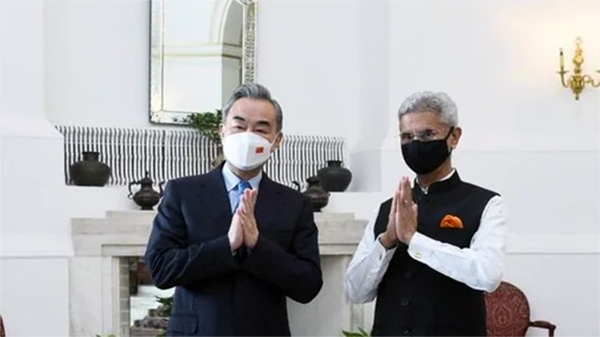India, on 25 March, conveyed a strong and candid message to China that bilateral ties between the two countries cannot return to normal if the situation in the border areas is “abnormal”.
In his nearly three-hour “candid” talks with visiting Chinese foreign minister Wang Yi, external affairs minister S Jaishankar asserted that restoration of normalcy in ties will require restoration of peace and tranquillity in the border areas.
Wang flew into Delhi from Kabul on 24 March evening in an unannounced trip in the first highest-level visit to India by a Chinese leader after the border standoff in eastern Ladakh erupted nearly two years ago.
At a media briefing shortly after his talks with Wang, Jaishankar said: “If we are both committed to improving our ties then this commitment must find full expression in the ongoing disengagement talks.”
Describing the current situation as a “work in progress”, he also said that relations between India and China have been “disturbed” as a result of the Chinese actions in April 2020.
“So long there are very large deployments, border situation is not normal. We still have ongoing friction areas, have made progress in resolving some friction areas including Pangong Tso. Our discussion today was how to take this forward,” he said.
The border issue is understood to have figured prominently in the meeting between Wang and Doval too. Both sides agreed on the importance of early and complete disengagement in remaining areas to allow bilateral ties to take their natural course. They also stressed the need to continue positive interactions at diplomatic,military levels for restoration of peace, sources said.
Wang also met National Security Adviser Ajit Doval, who pressed insisted on an early and complete disengagement of troops in Ladakh, a source with knowledge of the discussions said. “The continuation of the present situation is not in our mutual interest,” the source quoted Doval as telling Wang.
“Restoration of peace and tranquillity will help build mutual trust and create enabling environment for progress in relations,” Doval added.
New Delhi has made it abundantly clear that it cannot be “business as usual” with China until the border stand-off is resolved on mutually acceptable terms.
‘Allow Indian students to return’
Jaishankar also raised with his Chinese counterpart the issue of return of Indian students to China to resume their studies and hoped that Beijing will adopt a “non-discriminatory approach” on it.
“I took up strongly the predicament of Indian students studying in China who have not been allowed to return, citing Covid restrictions. We hope that China will take a non-discriminatory approach since it involves the future of so many young people,” Jaishankar said.
“Minister Wang Yi assured me that he would speak to the relevant authorities on his return on this matter. He also recognised the particular concerns that medical students have in this difficult situation,” he said.
A large number of Indian students had come back to India when China has closed down all universities following the outbreak of the Covid-19 pandemic. China had restricted travel by suspending visa and residence permits from March 27, 2020, in view of the pandemic.
‘There should be immediate ceasefire in Ukraine’
The two ministers agreed on the need for an immediate ceasefire and a return to the path of diplomacy and dialogue to defuse the war in Ukraine.
“Wang Yi presented the Chinese understanding, the Chinese view of the situation developed there and the developments pertaining to it, and I presented the Indian view,” Jaishankar said.
The external affairs minister said both sides discussed their respective approaches and perspectives and agreed that diplomacy and dialogue must be the priority.
“I think, the Indian view, many of you may have heard me speak about it yesterday in Parliament as well. And obviously, what he said was his view and what I said was my view, but where we had a common element was that both of us agreed on the importance of an immediate ceasefire as well as a return to diplomacy and dialogue,” he said.
The external affairs minister said in Parliament on 24 March that India’s position on the Russia-Ukraine conflict has been “steadfast and consistent” and that it wants resolution of the conflict through talks.
India has not criticised Russia yet for its invasion of Ukraine and also abstained from voting at the UN platforms in condemning the Russian attack.
China has close ties with Russia and it has been giving signals about its willingness to assist Moscow in offsetting the impact of economic sanctions announced by the US and other Western countries following the Russian attack on Ukraine.
Wang’s Kashmir remarks at OIC meet discussed
The external affairs minister said that the remark made by Chinese foreign minister at the OIC meet, which had sparked a strong response from New Delhi, featured in their talks.
Jaishankar said he conveyed to Wang that India hopes that China would follow an independent policy in respect to New Delhi and will not allow its policies to be influenced by other countries.
“Did the issue of what Minister Wang Yi said at the OIC (Organisation of Islamic Cooperation) Conference come up? Yes, it did. I referred to it. I explained to him, why we found that statement objectionable. It was a subject discussed at some length. There was a larger context as well,” Jaishankar told reporters.
“I conveyed that we hope that China would follow an independent policy in respect of India and not allow its policies to be influenced by other countries and other relationships,” said Jaishankar.
3,500 km long border, varied perceptions
The India-China border, stretching from Arunachal Pradesh in the east to Ladakh, is largely undemarcated. Both sides claim vast swathes of each other’s territory, primarily due to differences in perception about the exact location of the Line of Actual Control.
The border remained largely peaceful since the war of 1962, barring occasional skirmishes- until June 2020.
A violent clash erupted over a Chinese incursion into Indian territory and preventing Indian border patrols. 20 Indian soldiers were martyred when PLA troops attacked with hand-held weapons. Several reports said the Chinese side also suffered at least 35 casualties. However it has never been officially acknowledged by China.
Both sides deployed large number of troops and heavy weaponry in the region following the Galwan clash. The resulting stand-off has not been fully resolved, even after 15 rounds of military-level talks.
Growing trade, and the imbalance
Trade remains heavily tilted in Beijing’s favour. India’s trade deficit with China is the largest it has with any county, and the imbalance has been steadily widening.
The exports from India to China have increased from $10.17 billion in 2016-17 to $21.19 billion in 2020-21. The imports from China have increased from $61.28 billion to $65.21 billion during the same period.
More than 100 Chinese companies, including state-owned enterprises and electronics manufacturers that have come to dominate the country’s mobile phone market, operate in India.
Since the Galwan clash of 2020, New Delhi has tightened the screws on Chinese players by increasing scrutiny of investments or imports and banning some mobile apps.

















